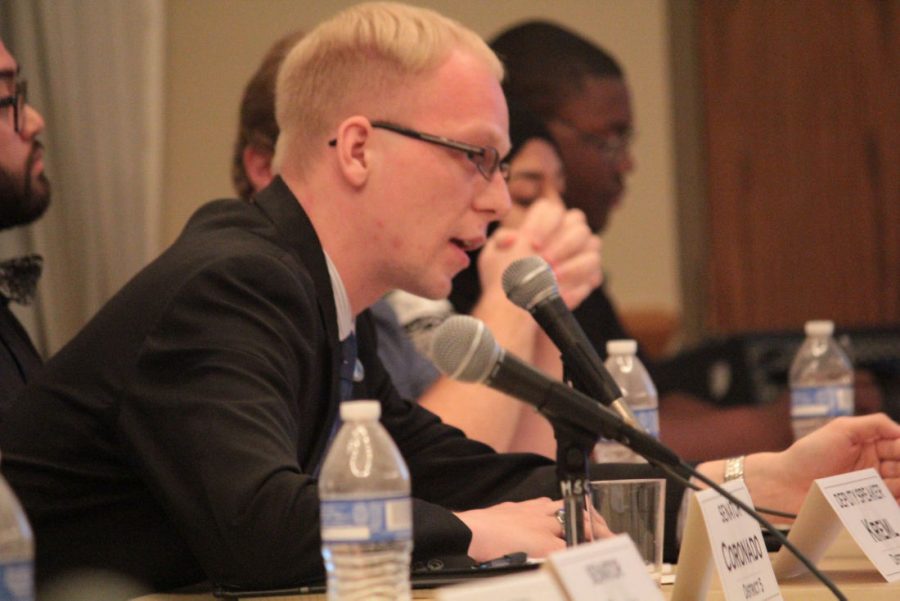SA Senate to amend election bylaws
Student Association Senator Robert Kreml talks about the addition of an ad hoc committee, of which he is chairman, on April 11 at SA Senate in the Holmes Student Center, Sky Room.
April 13, 2015
The Student Association Senate is considering 12 amendments to its bylaws to reflect the move to online elections.
The 2015 executive elections saw the SA’s first use of online voting through HuskieLink, a social media platform for student groups. Now, the SA Senate will look to move its fall elections to the spring, when the executive election isheld, as well as move to the online-only ballot platform. The Senate held first readings for amendments related to elections, which include a change to the membership of the Board of Elections, districts of the Senate and Internet outage policies, at its meeting on Sunday.
Ad hoc committee
An ad hoc committee was created to lessen the gray area with elections and to correct “any issues that are apparent with the online election system,” said SA Senate Speaker Dillon Domke. Deputy Speaker Robert Kreml, who was the vice presidential candidate of the Standing for Every Student ticket during the March executive election, was appointed chair of the ad hoc committee.
Domke said the Senate is looking to get a “diverse set of students” to serve the committee. Kreml wrote up additional bylaws but said he would not throw out the ones already in place. The committee would make sure what happened with this election and the misunderstanding of the new online elections does not happen next year, Kreml said, citing the Northern Star’s editorial on the SA clarifying the gray areas in the election policy. One senator from each district will be able to sit on the committee and review election policy to make amendments for online voting.
Election policies
Senator Rachel Gorsuch read proposed bylaws regarding a Internet outage during the times of the elections. The bylaw amendment will call for any minutes or hours of an Internet outage to be added to the election. Gorsuch read another amendment proposing to no longer hold the election commissioner solely responsible for staying in contact with Information Technology Services during election days. If the amendment passes, the commissioner would be able to delegate the responsibility to Board of Elections members.
Districts
Kreml read and authored a bill to redistrict the Senate due to the closure of Lincoln Hall and deconstruction of Douglas Hall. The changes Kreml added included eliminating one of the five districts and having 10 senators represent each district as opposed to the current eight. District 1 now includes all university housing, as it did not include Gilbert Hall and Northern View. District 2 now includes any housing west of Annie Glidden Road and north of I-88. District 3 is any housing east of Annie Glidden Road and south of I-88. District 4 includes anyone living outside of DeKalb city limits.
Senate elections
A bill that was read proposed Senate elections to be held together with SA executive elections in the spring rather than the fall. Senators who are already part of the Senate and wish to run in the executive election can now only run for either the Senate or executive branch as Domke said it would violate the checks and balances system for students to run for both.
Board of Elections changes
Former Election Commissioner David White read proposed bylaws that will make the Board of Elections have seven members instead of five members. Three people on this board will focus on advertising the Senate elections while the other three will focus on the executive elections. The chairman will then meet with the groups to check up with them. It was proposed a deputy election commissioner be added as a paid assistant to the commissioner. The election commissioner’s outline was changed in that the president would be able to appoint someone as commissioner at the first SA Senate meeting of the spring semester rather than two weeks before the selection of the Board of Elections. The commissioner is also now required to hold a candidate meeting on the Monday before elections.














